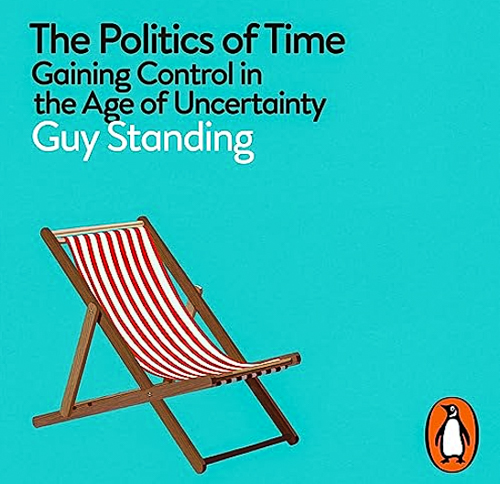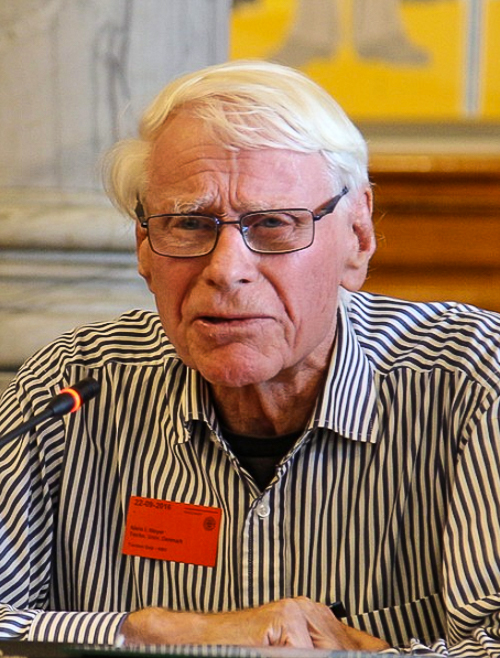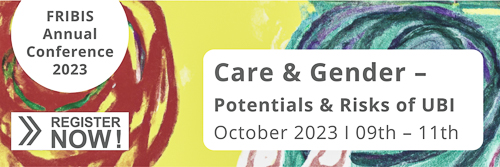
by Peter Knight | Oct 23, 2023 | News
“Time has always been political. Throughout history, how most people use their time has been defined and controlled by the powerful. Today is no exception. But we can reclaim control, and in this book, the pioneering economist Guy Standing shows us how.
The ancient Greeks organised time into five categories: work, labour, recreation, leisure and contemplation. Labour was onerous, while the keys to a good life were self-chosen work and leisure (schole), which included participation in public life and lifelong education. Yet now our jobs are supposed to provide all meaning in life; our time outside labour is considered simply ‘time off’, and politicians prioritise jobs above all else.
Today, we are experiencing the age of chronic uncertainty. Stress and mental illness are on the rise as more and more time is being stolen from us in myriad ways, particularly from the vulnerable and those in the precariat.”
Read More

by Peter Knight | Sep 17, 2023 | News
BIEN is recruiting for a new paid position as Asia/Pacific Hub Coordinator. The deadline to submit applications is 31 January 2024.
The Asia/Pacific Coordinator will be responsible for formalizing BIEN structures and operations in the Asia/Pacific region with respect to its current and potential affiliates and members; growing the conversation around and movement towards UBI.
Applicants need to submit a CV and cover letter explaining their motivation and fit for the position and email them to diana.bashur@basicincome.org.
To view the job description, requirements, and application information, click here.

by Peter Knight | Sep 13, 2023 | News
Comingle is an app under development that will unite people who want to make sure no one goes a week without income.
For a quick introduction, watch this video.
“We all need some extra money sometimes. Other times, we have a little extra to give. By connecting our finances using today’s technology, we can form a secure, anonymous network of generosity that automatically pools money and moves it to where it’s needed the most.”
In early September 2023 Comingle launched a crowndfund campaingn to raise US$75,000 to cover the development costs required to boost Comingle to the next phase, which will allow verification of user identities, detect fraud, address security concerns, and begin transferring real money on a weekly basis.
The ambitious goal is to get this launched and have at least 100,000 Americans living with a small UBI floor of around $50 a week by the end of 2025 that all those who join collectively make possible.
As of September 16, 57% of the goal had been reached with 19 days left to complete the job. Contributions are being matched (“Every time we hit another $1000 our matching donors will contribute $3000! Every dollar you donate now = $4!“). Comingle founder Conrad Shaw writes: “One of our $10K matching donors is doing a 1-1 match and remaining anonymous. The other $10K matching donor is doing a 2-1 match and is Katie Moussouris, who made a name for herself as a white hat hacker (the good kind of hacker) and is CEO/Founder of Luta Security.”
ITSA President and BIEN Member Scott Santens has a blog post supporting the campaign. He thinks is an important project, and writes that Forward Party Co-Chair Andrew Yang “dropped into one of our Spaces talking about this, and donated $5k live during the stream.”

by Peter Knight | Sep 7, 2023 | News
Niels I. Meyer, a pioneer in the Danish Basic Income movement and co-founder of BIEN, has passed away. A prolific writer as well as a frequent participant in public debates, Niels I. Meyer was in his professional life a professor in physics with important contributions to Denmark’s transition to sustainable energy.
Read more by clicking here.

by Peter Knight | Aug 31, 2023 | News
The FRIBIS Annual Conference 2023 from Oct. 09 – Oct. 11 will focus on Care & Gender as fundamental dimensions of human societies. It is dedicated to research, approaches and the possible interactions of care & gender in context of the Unconditional Basic Income (UBI). Although care and gender have many intersections, they have unique characteristics and specificities that necessitate separate consideration. Therefore, FRIBIS welcomes contributions which address the theme of care and gender separately or in tandem.
For more information visit the FRIBIS website.
Highlights (Keynotes & Panel Discussion)
Keynotes
Prof. Dr. Almaz Zelleke (NYU Shanghai): “Toward a Gender-Inclusive Social Policy State”
Prof. Dr. Ben Trott: “A Queer Case for the Basic Income at Our Current Conjuncture: Political Philosophy, Individual Rights and De-Individualisation“
Mag. Margit Appel: „Zusammendenken: Arbeit – Care – Grundeinkommen“
Panel Discussion
„Care-Ökologie und das Grundeinkommen: eine komplexe Beziehung“ mit Prof. Dr. Ute Fischer (Moderation) und den Gästen: Mag. Margit Appel, Prof. Dr. Georg Cremer, Dr. Christine Rudolf & Prof. Dr. Sascha Liebermann.






